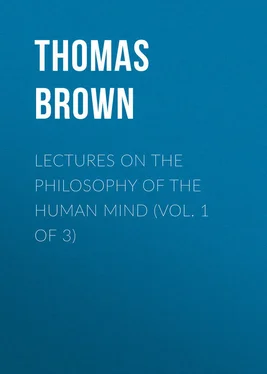Thomas Brown - Lectures on the Philosophy of the Human Mind (Vol. 1 of 3)
Здесь есть возможность читать онлайн «Thomas Brown - Lectures on the Philosophy of the Human Mind (Vol. 1 of 3)» — ознакомительный отрывок электронной книги совершенно бесплатно, а после прочтения отрывка купить полную версию. В некоторых случаях можно слушать аудио, скачать через торрент в формате fb2 и присутствует краткое содержание. Жанр: foreign_antique, foreign_prose, на английском языке. Описание произведения, (предисловие) а так же отзывы посетителей доступны на портале библиотеки ЛибКат.
- Название:Lectures on the Philosophy of the Human Mind (Vol. 1 of 3)
- Автор:
- Жанр:
- Год:неизвестен
- ISBN:нет данных
- Рейтинг книги:5 / 5. Голосов: 1
-
Избранное:Добавить в избранное
- Отзывы:
-
Ваша оценка:
- 100
- 1
- 2
- 3
- 4
- 5
Lectures on the Philosophy of the Human Mind (Vol. 1 of 3): краткое содержание, описание и аннотация
Предлагаем к чтению аннотацию, описание, краткое содержание или предисловие (зависит от того, что написал сам автор книги «Lectures on the Philosophy of the Human Mind (Vol. 1 of 3)»). Если вы не нашли необходимую информацию о книге — напишите в комментариях, мы постараемся отыскать её.
Lectures on the Philosophy of the Human Mind (Vol. 1 of 3) — читать онлайн ознакомительный отрывок
Ниже представлен текст книги, разбитый по страницам. Система сохранения места последней прочитанной страницы, позволяет с удобством читать онлайн бесплатно книгу «Lectures on the Philosophy of the Human Mind (Vol. 1 of 3)», без необходимости каждый раз заново искать на чём Вы остановились. Поставьте закладку, и сможете в любой момент перейти на страницу, на которой закончили чтение.
Интервал:
Закладка:
I have also endeavoured to point out to you, in what manner we are led to believe, that we explain the sequence of two events, by stating some intermediate event. If asked, How it is that we hear a voice at a distance, or see a distant object? we immediately answer, Because the primary vibration of the organs of speech is propagated in successive vibrations through the intervening air, and because light is reflected or emitted from the distant object to the eye; and he who hears this answer, which is obviously nothing more than the statement of another effect, or series of effects, that takes place before that particular effect, concerning which the question is put, is perfectly satisfied, for the time, with the acquisition which he has made, and thinks, that he now knows, how it is, that we hear and see. To know why a succession of events takes place, is thus at length conceived by us, to be the same thing, as to know some other changes, or series of changes, which take place between them; and, with this opinion, as to the necessary presence of some intervening and connecting link, it is very natural, that, when we can no longer state or imagine any thing which intervenes, we should feel as if the sequence itself were less intelligible, though unquestionably, when we can state some intervening circumstance, we have merely found a new antecedent in the train of physical events, so as to have now two antecedents and consequents, instead of one simple antecedent and consequent, and have thus only doubled our supposed mystery, instead of removing it.
Since it does appear to us, however, to remove the very mystery which it doubles, it is the same thing, with respect to our general practice of philosophizing, as if it did remove it. If we suppose the intervention of some unknown cause, in every phenomenon which we perceive, we must be equally desirous of discovering that unknown cause, which we suppose to be intermediate, – and, when this is not easily discoverable, we must feel a strong tendency to divine what it is, and to acquiesce, more readily than we should otherwise have done, in the certainty of what we have only imagined, – always, of course, imagining the cause, which seems to have most analogy to the observed effect.
Such is the nature of that illusion, from which the love of hypotheses flows, – as seeming, by the intervention of a new antecedent, to render more intelligible the sequences of events that are obviously before us, – though all which is truly done, is to double the number of antecedents; and, therefore, to double, instead of removing the difficulty, that is supposed to be involved in the consideration of a simple sequence of events. A stone tends to the ground – that it should have this tendency , in consequence of the mere presence of the earth, appears to us most wonderful; and we think, that it would be much less wonderful, if we could discover the presence, though it were the mere presence , of something else. We therefore, in our mind, run over every circumstance analogous, to discover something which we may consider as present, that may represent to our imagination the cause which we seek. The effect of impulse , in producing motion, we know by constant experience; and, as the motion, which it produces, in a particular direction, seems analogous to the motion of the stone in its particular direction, we conceive, that the motion of a stone, in its fall to the earth, is rendered more intelligible, by the imagined intervention of some impelling body. The circumstances, which we observe, however, are manifestly inconsistent with the supposition of the impulse of any very gross matter. The analogies of gross matter are accordingly excluded from our thoughts, and we suppose the impulse to proceed from some very subtle fluid, to which we give the name of ether , or any other name, which we may choose to invent for it. The hypothesis is founded, you will observe, on the mere analogy of another species of motion, and which would account for gravitation by the impulse of some fine fluid. It is evident, that there may be, in this way, as many hypotheses to explain a single fact, as there have been circumstances analogous observed in all the various phenomena of nature. Accordingly, another set of philosophers, instead of explaining gravitation by the analogy of impulse , have had recourse to another analogy, still more intimately familiar to us – that of the phenomena of life: We are able to move our limbs by our mere volition. The mind, therefore, it is evident, can produce motion in matter; and it is hence some interposed spiritual agent, which produces all the phenomena of gravitation. Every orb, in its revolution on its axis, or in its great journey through the heavens, has, according to this system of philosophical mythology, some peculiar genius , or directing spirit, that regulates its course, in the same manner as, of old, the universe itself was considered as one enormous animal, performing its various movements by its own vital energies. It is the influence of this analogy of our own muscular motions, as obedient to our volition, – together with the mistaken belief of adding greater honour to the divine Omnipotent, – which has led a very large class of philosophers to ascribe every change in the universe, material or intellectual, not to the original foresight and arrangement merely, – the irresistible evidence of which even the impiety, that professes to question it, must secretly admit, – but to the direct operation of the Creator and Sovereign of the world, —
“The mighty Hand,
That, ever busy, wheels the silent spheres,
Works in the secret deep; shoots streaming thence
The fair profusion that o'erspreads the spring;
Flings from the sun direct the flaming day;
Feeds every creature; hurls the tempest forth;
And, as on earth this grateful change revolves,
With transport touches all the springs of life.”
So prone is the mind to complicate every phenomenon, by the insertion of imagined causes, in the simple sequences of physical events, that one hypothesis may often be said to involve in it many other hypotheses, invented for the explanation of that very phenomenon, which is adduced in explanation of another phenomenon, as simple as itself. The production of muscular motion by the will, which is the source of the hypothesis of direct spiritual agency, in every production of motion, or change, in the universe, has itself given occasion to innumerable speculations of this kind. Indeed, on no subject has the imagination been more fruitful of fancies, that have been strangely given to the world under the name of philosophy. Though you cannot be supposed to be acquainted with the minute nomenclature of anatomy, you yet all know, that there are parts termed muscles , and other parts termed nerves , and that it is by the contraction of our muscles that our limbs are moved. The nerves, distributing to the different muscles, are evidently instrumental to their contraction; since the destruction of the nerve puts an end to the voluntary contraction of the muscle, and consequently to the apparent motion of the limb. But what is the influence that is propagated along the nerve, and in what manner is it propagated? For explaining this most familiar of all phenomena, there is scarcely any class of phenomena in nature, to the analogy of which recourse has not been had, – the vibration of musical chords, – the coiling or uncoiling of springs, – the motion of elastic fluids, electricity, magnetism, galvanism; – and the result of so many hypotheses, – after all the labour of striving to adapt them to the phenomena, and the still greater labour of striving to prove them exactly adapted, when they were far from being so – has been the return to the simple fact , that muscular motion follows a certain state of the nerve; – in the same manner, as the result of all the similar labour, that has been employed to account, as it has been termed, for gravitation, has been a return to the simple fact, that, at all visible distances observed, the bodies in nature tend toward each other.
Читать дальшеИнтервал:
Закладка:
Похожие книги на «Lectures on the Philosophy of the Human Mind (Vol. 1 of 3)»
Представляем Вашему вниманию похожие книги на «Lectures on the Philosophy of the Human Mind (Vol. 1 of 3)» списком для выбора. Мы отобрали схожую по названию и смыслу литературу в надежде предоставить читателям больше вариантов отыскать новые, интересные, ещё непрочитанные произведения.
Обсуждение, отзывы о книге «Lectures on the Philosophy of the Human Mind (Vol. 1 of 3)» и просто собственные мнения читателей. Оставьте ваши комментарии, напишите, что Вы думаете о произведении, его смысле или главных героях. Укажите что конкретно понравилось, а что нет, и почему Вы так считаете.












![Anne Blunt - A Pilgrimage to Nejd, the Cradle of the Arab Race. Vol. 1 [of 2]](/books/749489/anne-blunt-a-pilgrimage-to-nejd-the-cradle-of-the-thumb.webp)